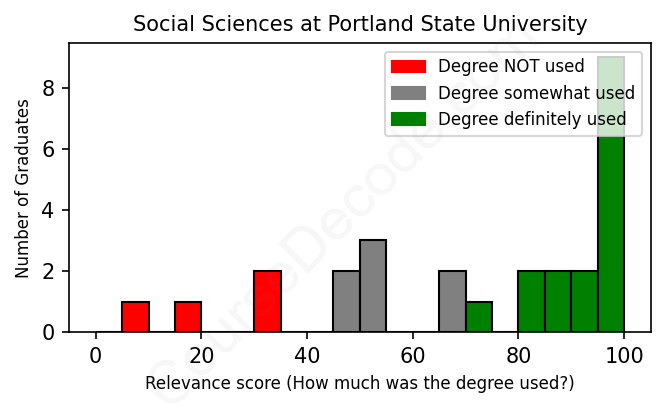
First, some facts. Of the Social Sciences graduates from Portland State University we've analyzed , here's how many have used (or NOT used) their degree in their career:

These are estimates based on AI analysis of 27 LinkedIn profiles (see below).
The verdict? Slightly above average. Overall, with an average relevance score of 72%, Social Sciences graduates from Portland State University have a slightly higher likelihood (+5%) of finding work in this field compared to the average graduate across all fields:
And for comparison, here's the chart for all profiles we've looked at across all degrees.
Also, after graduating, only 22% of these graduates have pursued further education other than another Bachelor's degree (such as a Masters degree or other), compared to the average across all profiles of 35%. This suggests a Bachelors degree is enough for most Social Sciences graduates, and it's normal to look for work straight after graduation.
See the details:
|
Relevance score: 34% We think this person has NOT gone into a career related to their degree. We think this person has NOT gone into a career related to their degree.
DEGREE INFOGraduated in 2020 from Portland State University with a Bachelor's degree in Social Sciences. Also pursued further education since (see below). JOB HISTORY SINCE GRADUATIONSales and Consignment Associate Village Merchants Jun 2020 - Mar 2022 Restaurant Supervisor and Breakfast Chef  Canopy by Hilton Portland Pearl District Nov 2021 - Sep 2022 Pizza Dough  Ranch Pizza Jan 2023 - Apr 2023 Writing Consultant  Pepperdine University Graduate School of Education and Psychology Oct 2023 - Present FURTHER DEGREES DONE SINCE GRADUATINGMaster's degreePepperdine University 2022 - 2024 ABOUTI am currently enrolled in the Masters of Psychology program at Pepperdine University. My love for research began while formulating a proposal for a longitudinal study on an emotional intelligence-based intervention program working with adolescent males and its effects on levels of aggression for a course in research methods. This project was heavily influenced by my experience in a psychology of men and masculinities course. Post-bachelor's, I volunteered as a research assistant at Portland State in the field of intimate partner violence within the Latinx community. My main contribution was constructing annotated bibliographies to contribute to a literature review supporting a proposed dissertation. Constructing, analyzing, and synthesizing data has been the most gratifying work I have done thus far. I enjoy helping friends and classmates complete peer reviews, editing drafts of their work with a focus on refining what message they are attempting to convey. My continued interests in research include alexithymia, competition or the prisoners dilemma, emotional intelligence, and various evidence-based and novel interventions.Throughout my educational career I have worked food service positions and am now looking to advance into my professional career. I am looking for a role that will provide tools and knowledge to aid in further pursuits of research. Most recently I was promoted to a position as a restaurant supervisor due to my organizational skills, reliability, practicality, problem solving abilities, efficiency, attention to detail, and adeptness at a multitude of tasks and duties. My education is my highest priority, and while restaurant supervisory has been a very fulfilling and impactful position, I am hoping to find a job that aligns well with my future career and coursework. I have a wealth and colorful variety of experience under my belt that provide me with unique skills including massage therapy, reiki, and teaching. Through my apprenticeship with the non-profit, Language Hunters, I learned to teach playfully with all ages and start from scratch using journalistic style inquisitiveness to light my path. My early experience in theater and improv has guided my focus in all work environments toward cooperative teamwork and I aim to direct my focus to where it is most useful or needed. I am pursuing a PhD in clinical psychology so I can continue to optimize my analytic abilities, interpersonal skills, and use critical thinking to assemble all the thoughts and ideas these experiences have impressed upon me. |
The top 10 most common jobs done by the graduates we've analyzed (ranked most common to least) are:
When looking at the various jobs held by graduates of the Social Sciences program at Portland State University, it's clear that many have ventured into roles that are only loosely connected to their degree. A lot of people ended up in recruitment positions, such as Healthcare Recruiters or Corporate Recruiters, which, while they involve some understanding of human behavior, don't heavily rely on social sciences principles. Similarly, there are individuals in management or operational roles, like Assistant Managers or Program Managers, that utilize general interpersonal skills but don't specifically draw on the core social science skills learned in their studies. You also have several grads who became business owners or self-employed individuals, where they might apply social science principles indirectly through understanding consumer behavior or community dynamics, but the connection isn't always direct.
On a brighter note, there are definitely standout jobs where these graduates applied their social sciences expertise in a meaningful way. Positions like social worker or community program manager clearly demonstrate the use of social science principles in addressing real-world issues, from counseling youth to managing community initiatives. Roles like those at domestic violence shelters or health organizations heavily draw upon the foundational theories in social sciences. It's a mixed bag, honestly; while some jobs don't seem directly relevant, others show that there's a significant and impactful intersection between the graduates’ work and their educational background. In a nutshell, while social sciences graduates are finding their footing in various industries, the direct relevance of their roles to the degree varies a lot.
Here is a visual representation of the most common words in job titles for Social Sciences graduates (this is across all Social Sciences graduates we've analyzed, not just those who went to Portland State University):

Graduates from Portland State University who earned their degrees in Social Sciences tend to have varied career trajectories, often starting in positions that may or may not directly align with their field of study. Many of them seem to take on roles in social services, recruitment, and education shortly after graduation. For instance, people often begin their careers as employment specialists, case managers, or in teaching roles. This initial employment seems to reflect their background in social sciences, focusing on helping others and contributing to community well-being. However, there are also quite a few who veer off into seemingly unrelated fields like hospitality or entrepreneurship.
By the time they hit the 5- to 10-year mark in their careers, some graduates find themselves in leadership positions or even running their own businesses, like in healthcare or community program management. Others seem to have remained in social services or education, climbing up the ranks to more significant roles, like program directors or senior managers. However, there's also a considerable segment that has transitioned into more conventional corporate roles, some gravitating toward the recruiting or marketing sectors. Overall, while some grads have forged successful careers that build on their social science education, others appear to have diversified their paths into a mix of different industries, making it a bit of a mixed bag in terms of career relevance to their degrees. So, while there are definitely success stories tied to social sciences, there's also evidence of graduates exploring various opportunities beyond their original field. It’s a bit of everything, really!
Honestly, a Bachelor’s degree in Social Sciences, whether at Portland State University or anywhere else, can be a pretty mixed bag. It often leans towards the easier side compared to more technical degrees like Engineering or Chemistry, mainly because it involves more reading, writing, and discussions rather than super hard math or science labs. That said, it can still be challenging—especially if you get into research projects or classes that require deep critical thinking and a lot of reading. Basically, if you're interested in the topics and stay organized, it shouldn’t be too overwhelming, but there will definitely be some hard work involved!
Most commonly, in the LinkedIn profiles we've looked at, it takes people 2 years to finish a Bachelor degree in Social Sciences.
Looking at the job paths of these Portland State University Social Sciences grads, it seems like many of them have found decent opportunities, but the money situation might be a mixed bag. Some, like those in corporate recruiting and tech consulting, likely pulled in pretty good salaries, especially as they moved up in their careers. Others, especially in social work or the nonprofit sector, might not be making as much, even if they’re making a real difference. A few have entrepreneurial ventures, which could be hit or miss depending on how well they do. Overall, while some are probably doing well financially, others may still be grappling with a tighter budget, so it really depends on the specific field and that individual's career choices.
Here is a visual representation of the most common words seen in the "about" section of LinkedIn profiles who have a Bachelor degree in Social Sciences (this is across all Social Sciences graduates we've analyzed, not just those who went to Portland State University). This may or may not be useful:

Here are all colleges offering a Bachelor degree in Social Sciences (ordered by the average relevance score of their Social Sciences graduates, best to worst) where we have analyzed at least 10 of their graduates:
| College | Score | Count |
|---|---|---|
 Portland State University Portland State University
|
72 | 27 |
 University of Maryland University College University of Maryland University College
|
63 | 10 |
 Kansas State University Kansas State University
|
54 | 13 |
 Washington State University Washington State University
|
53 | 11 |
 Ashford University Ashford University
|
51 | 27 |
 Florida State University Florida State University
|
49 | 11 |